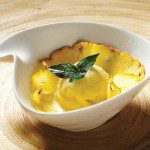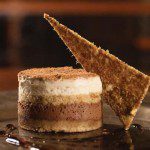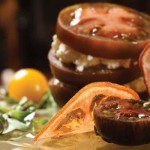Elizabeth Petty was diagnosed with breast cancer in April 2009. Determined to overcome the disease, she underwent radiation and chemotherapy, but ventured further out into alternative healing methods. Choosing an integrative approach to medicine, Petty immersed herself into the extraordinary lives of those who healed themselves naturally through diet and exercise. She began eating a raw food diet. Now cancer free, she has merged her career with her lifestyle, creating a platform to raise awareness of this remarkable, beneficial approach to health. Her restaurant and catering service, Elizabeth’s Gone Raw, is a celebration of organic, fresh ingredients, which brings the bright and ebullient flavors of nature, as well as its unparalleled health benefits, to Washington. She spoke to us about her journey, the benefits of raw and vegan diets, and shared recipes and secrets of integrating this health approach into a regular lifestyle.
Georgetowner: So…a raw food diet seems fairly daunting. But is it worth the effort?
Elizabeth Petty: Eating a raw and vegan diet is absolutely worth the effort on many levels— spiritually and emotionally as well as physiologically. A plant-based diet offers an abundance of protein. It is rejuvenating, it offers mental clarity, and it provides a rich source of enzymes which act as catalyst in the cells and assist in oxygenating your body by separating red blood cells. Oxygen can then move freely through the blood stream, allowing the white blood cells to fight disease.
A raw and vegan diet helps prevent heart disease, cancer and diabetes, too. It is especially important to eat organic and locally grown raw fruits and vegetables free of pesticides, which further increases your sense of wellbeing. From an emotional perspective, a diet free of preservatives, meat, dairy, caffeine, alcohol and processed sugar helps calm your central nervous system, creating a balance of energy and emotional stability. With this stability comes the opportunity to pursue spiritual awareness and personal harmony with greater focus.
GT: Many worry about the gastronomic monotony and restrictions of a diet as stringent as this. Does your palate ever get bored? How does the food taste?
EP: I don’t find it at all boring or monotonous. It requires thoughtful effort put into the preparation of food using a wide variety of ingredients, including all vegetables, fruits, nuts, grains, seeds and sea vegetables.
A dinner at Elizabeth’s Gone Raw can include: hemp and flax cracker topped with olive tapenade, shaved fennel slaw and chive oil; baby arugula with Royal Trumpet Mushrooms and truffle vinaigrette; cantaloupe-basil sorbet; and thinly sliced sheets of zucchini layered with pine nut ricotta, pesto and pear tomatoes with parsley salad
GT: Is it a difficult diet to maintain?
EP: It is difficult to maintain at first because you have to change the way you think about food. You also have to find the right sources for organic foods, which requires a bit of research. When I started drinking green juice three times a day, my initial feeling was one of concern in fear that I would not be able to keep up the pace of juicing so frequently. Now, almost two years later, I find that I crave raw vegetables and will plan my day around finding the opportunity to juice. I just recently traveled overseas for ten days and took my juicer with me. I was welcomed in every hotel kitchen and shared with the staff daily shots of wheatgrass and green juice. It is healing to share with others such nutritious, healthful foods that promote wellbeing. It is a small way to give back to the universe.
What we choose to put into our bodies becomes a reflection of how we choose to live with respect to our planet. Eating becomes a philosophy of life, a ritual by which food nourishes and heals our bodies. It is less about consumption and more about fulfillment and awareness. Raw, living cuisine heightens the senses. It is sexy, alive and clean!
GT: What propelled you into the culinary subculture of raw foods?
EP: My breast cancer diagnosis allowed me the opportunity to choose a different lifestyle. There is so much information available about natural healing in regards to cancer. I am most grateful to Kris Carr who wrote “Crazy Sexy Cancer Tips” and to Dr. Brian Clement, the director of Hippocrates Health Institute, both of whom had a profound influence on the choices I have made in regards to treatment. Although I chose to have surgery followed by chemotherapy and radiation, my raw diet in conjunction with treatment gave me the strength to endure such a rigorous medical schedule.
GT: Had you any real experience with raw foods before your breast cancer diagnosis?
EP: Quite honestly, I had read an article in Atlantic Monthly about ten years ago about a raw diet, at which point I thought sounded a bit odd and not at all appealing. Life is wonderfully circular that way.
GT: Do you remember your first culinary experience with the cuisine of a raw food diet?
EP: My first experience with beautifully prepare raw cuisine was at Hippocrates Health Institute, which I attended for three weeks after I completed my chemotherapy and radiation treatments. Every cell in my body responded positively to the nutritious food I was given to eat, and by the end of the stay I felt as though I had been reborn. I felt encouraged about eating raw and recognized that my path had been chosen. During this period or recuperation and healing, it became clear to me that I wanted to offer to DC an alternative cuisine, raw, living and organic high end cuisine.
GT: Are you cancer free now?
EP: I am presumably cancer free. More importantly, though, I feel grateful to have had cancer. I can honestly say that I feel more fulfilled now in life than prior to my diagnosis.
Life is full of challenges. Enlightenment comes from the way in which we choose to deal with disparity. I have truly been blessed and intend to share with others these alternative ways of healing.
GT: Why did you choose to steer your newfound lifestyle into a career?
EP: My life and my career have always been intertwined. It is so important to me to educate people about the health benefits and wonderful taste of raw cuisine. It is yet another form of art in the culinary world, one with compassion and thoughtfulness.
GT: Who is in charge of creating your menu?
EP: The raw cuisine at Elizabeth’s Gone Raw is prepared by my executive chef Tom Berry and my pastry chef Calvin Lee, both of whom have taken on the challenge with much enthusiasm. Because I am still in the early stages of healing, I eat very simply prepared salads with plenty of sprouts, avocados, sea vegetables, lemon and organic virgin olive oil. I will occasionally eat a cooked yam or quinoa and when dining out, and I opt for anything vegan on the menu as long as it is a grain.
If you’re not familiar with raw cuisine, I would recommend dining at Elizabeth’s Gone Raw before you start preparing or eating raw. It will hopefully dispel any myths you have heard about raw food and encourage you to embrace the lifestyle so that the rewards are profound. Our spicy kale chips have been getting quite a bit of press and are easy to prepare.
Krispy Kale Chips
—
These chips are not only a wonderful healthy alternative to traditional snack chips, they are fun to make! This is recipe allows for a lot of experimentation, feel free to try spicier chips or chips with more lemon. There are many ways to make your unique kale chip.
Equipment: Food Processor, Dehydrator
Ingredients
3 heads kale
5 red peppers
1 pound cashews
2/3 cup nutritional yeast
2 cups water
2 tablespooons sea salt
2/3 cup lemon juice
1 jalapeno
1/2 tablespoon cayenne
Soak the cashews at least two hours. De-stem the kale, dice the red peppers and jalapeno and juice the lemon. Combine all ingredients, except for the kale, in a food processor and mix until desired creamy consistency. Massage the mixture into the kale. Flatten the kale pieces and place into dehydrator at 115 degrees overnight or until desired crispiness is achieved.





